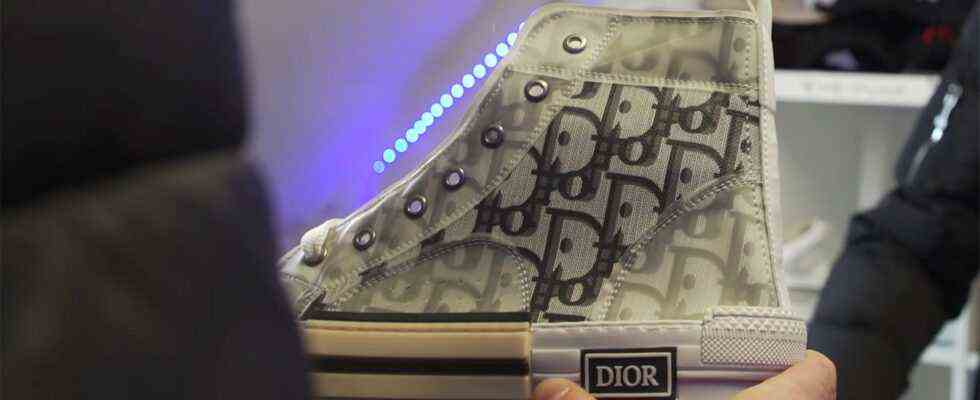Exclusive
Status: 07.09.2021 5:00 p.m.
A network of underground shops selling counterfeit branded clothing has developed in Germany. These come from dubious wholesalers, among others. This is shown by research into the reporter format STRG_F (NDR / funk).
Generation Z is the fastest growing target group of luxury companies. According to surveys by the management consultancy Bain & Company, those under 26 years of age now account for 13 percent of sales. According to the Bundesbank, this is where they earn the least money. This shows that there is a need for luxury, but most of them lack the financial means. Therefore, counterfeit products are popular.
According to STRG_F research, there are around 400 sellers throughout Germany who offer their counterfeit branded products via social media. In some cases, customers can even enter the vendors’ shops, which are often located in basements or attics. Finding the culprit is a game of cat and mouse between law enforcement agencies and salespeople. They face advertisements from the rights holders and high fines.
The shops of the sellers with counterfeit branded products are often located in basements or in attics.
Image: STRG_F
Organized crime is behind it
The goods come either directly from abroad or from German wholesale centers. In some of the centers there are networks of traders who organize trade among themselves. The customs authorities notice an increasing professionalization. “The senders or main perpetrators, who operate from abroad, are building up ‘middleman chains’ with nationwide interrelationships based on the tried and tested pattern in Germany, who sell the counterfeit goods via various online shops,” says Andre Lenz, spokesman for the General Customs Directorate.
Behind it are tightly organized, international gangs that build and expand business structures with considerable capital investment, reports Lenz. “If you buy counterfeits, you finance directly in gangs,” reports Nicolás Schmitz, attorney for trademark law and product piracy. He represents various well-known designer brands when it comes to prosecution, for example. According to the EU, these structures have grown even further due to the pandemic because many people have ordered online.
“It’s one thing that is increasing and the brand owners have to invest more time and money to take the products off the market,” says Schmitz. They would also notice an increase if a celebrity wore such a product or the brand appeared in a song. “People want to suggest that they can afford the brand.”
As a trademark attorney, Nicolás Schmitz represents various well-known designer brands.
Image: STRG_F
Influence through rap and social media
The demand for these counterfeit products is predominantly from a very young target group. Among other things, the marketing strategies of the luxury brands create a real hype about these products. For example, the brands enter into cooperation with well-known influencers or artists who receive money for posting the products on social media and often have a young target group themselves. Trademark attorney Schmitz explains: “That a company advertises a product so that it generates its own sales is, I think, economically logical.”
YouTube formats such as “How much is your outfit worth?” increase the desire for expensive clothing. This is also clear to YouTuber Lion Salijevic himself: “You can tell that the age limit gets younger and younger over time. So people are interested in expensive clothes when they are younger.” Nonetheless, he thinks: “It’s unavoidable, that somehow you also have a negative aspect with it. That’s just the way it is.”
The German rap, the most popular genre of music in the generation, also addresses brands: According to an evaluation by STRG_F, brand names are in almost half of the texts of the more than 70 number 1 hits in rap in the last five years. That also influenced the youth. Rapper Kontra K explains in an interview: “We got in front of cameras quickly and grow as people there. And that includes mistakes.” He admits, “We fucked up quite a bit, and saying ‘Yeah, they’re not our kids’ is the cheapest excuse.”
German rapper Kontra K admits mistakes in his lyrics, which often deal with brands.
Image: STRG_F
New plans against brand piracy
The luxury companies themselves try to prevent online sales of counterfeit branded products with a lot of effort. Gucci and Facebook, for example, have a cooperation that is supposed to make Facebook pay more attention to the deletion of fake product advertisements on their platforms.
LVMH, the industry leader in the luxury goods industry, is planning, together with Prada and Richemont, a technologically sophisticated monitoring of the supply chain in order to be able to differentiate between counterfeits and originals. “You have to try to prevent the products from reaching the end market, for example in Germany,” says trademark lawyer Schmitz.

